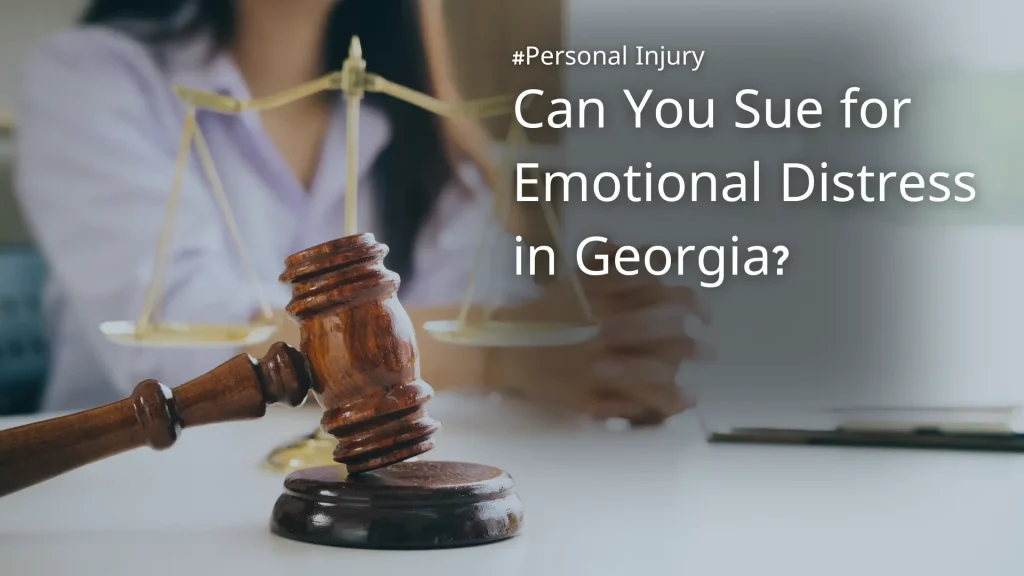Posted on Saturday, October 5th, 2024 at 9:00 am

A severe accident or injury is more than a physical loss. Physical trauma often leads to emotional distress, including nightmares, anxiety, depression, insomnia, panic attacks, and other symptoms. No wonder one frequent question our Georgia personal injury attorneys receive is, “Can you sue for emotional distress?”
That’s a complicated question, but the short answer is yes, you can sue for emotional distress in Georgia. However, you usually cannot recover compensation for emotional distress without an accompanying physical injury. This is a nuanced subject, though; you’ll find more detailed information below.
Suing for Emotional Distress After Sustaining Physical Injuries
Georgia law (O.C.G.A. § 51-12-6) prevents you from recovering compensation for emotional distress if the accident didn’t also cause physical injuries. Lawyers call this concept the “impact rule.” However, since most accidents involve physical injuries, this situation applies to most accident victims. In these cases, you can likely recover compensation for the emotional toll the accident has taken on your daily life.
Medical records, therapist notes, or testimony from friends or family all support your claim for emotional distress. Furthermore, your physical injuries help strengthen your emotional distress claim because they link the mental suffering to the accident. By including emotional distress in a personal injury claim, you could recover more compensation to address both your physical and mental health needs.
Suing for Emotional Distress Without Physical Injuries
To understand the challenges of suing for emotional distress in Georgia without physical injuries, it helps to know how these cases usually work. Most Georgia personal injury cases are based on negligence, meaning someone didn’t take reasonable steps to prevent the accident. It’s rare for someone to intentionally cause an accident, and proving intent to harm typically isn’t necessary in these cases.
Why does this matter? Because Georgia law distinguishes between negligent infliction of emotional distress and intentional infliction of emotional distress. In a personal injury claim based on negligence, Georgia’s impact rule prevents people from suing for emotional distress without physical injuries. Cases involving intentional infliction of emotional distress work differently, though. If you sue someone for intentionally inflicting emotional distress on you, you could recover compensation without accompanying physical injuries. However, this is not necessarily the case in all situations, as Georgia case law in this area constantly evolves. A personal injury lawyer can review your case to see if you meet the requirements to recover compensation for emotional distress.
Some situations that may qualify as intentional infliction of emotional distress include:
- A driver intentionally rams into your car during a road rage incident, causing both physical and emotional trauma.
- Someone threatens you with violence after a minor car accident, leaving you in constant fear for your safety.
- A person deliberately spreads false information about your involvement in a crash, damaging your reputation and causing extreme anxiety.
- The at-fault driver harasses you repeatedly after the accident, worsening your existing emotional distress.
Example of Emotional Distress in Personal Injury Claims
Common examples of emotional distress from accidents in Georgia include:
- Anxiety about driving or traveling in vehicles
- Persistent nightmares or flashbacks about the accident
- Depression or feelings of hopelessness
- Insomnia or difficulty sleeping due to stress
- Fear of leaving home or engaging in normal activities
- Mood swings or irritability
- Difficulty concentrating or making decisions
- Loss of interest in hobbies or social activities
- Feelings of guilt or self-blame
Proving Emotional Distress in Georgia Personal Injury Cases

Since emotional distress does not always manifest as physical symptoms, proving how an accident affected you emotionally can be difficult. Some evidence you can use to prove your emotional distress from an accident include:
- Medical Records: Documentation from doctors, therapists, or mental health professionals can show the emotional impact of the accident. For example, records of treatment for anxiety, depression, or post-traumatic stress disorder (PTSD) can link your emotional distress to your physical injuries.
- Witness Testimony: Friends, family, or coworkers can testify about changes in your behavior since the accident. They might describe how your personality has shifted or how you struggle with everyday tasks.
- Therapist Notes: Mental health professionals can explain how the accident has impacted your mental health and well-being. If you’ve sought counseling or therapy, notes from these sessions can provide detailed insight into your emotional struggles.
- Journal Entries: Personal journals documenting your thoughts and feelings after the accident can help show a pattern of emotional suffering. These entries provide a firsthand account of how the accident has affected you emotionally over time.
Jonathan R. Brockman, P.C. believes anyone who has suffered emotional distress after an accident deserves fair compensation. Call 770-205-8887 now or complete our contact form for a free case review. Our lawyers have the legal capacity and proven record of success to help you with your case.
Related Posts:
Why Is My Car Accident Settlement Taking So Long in Atlanta?
